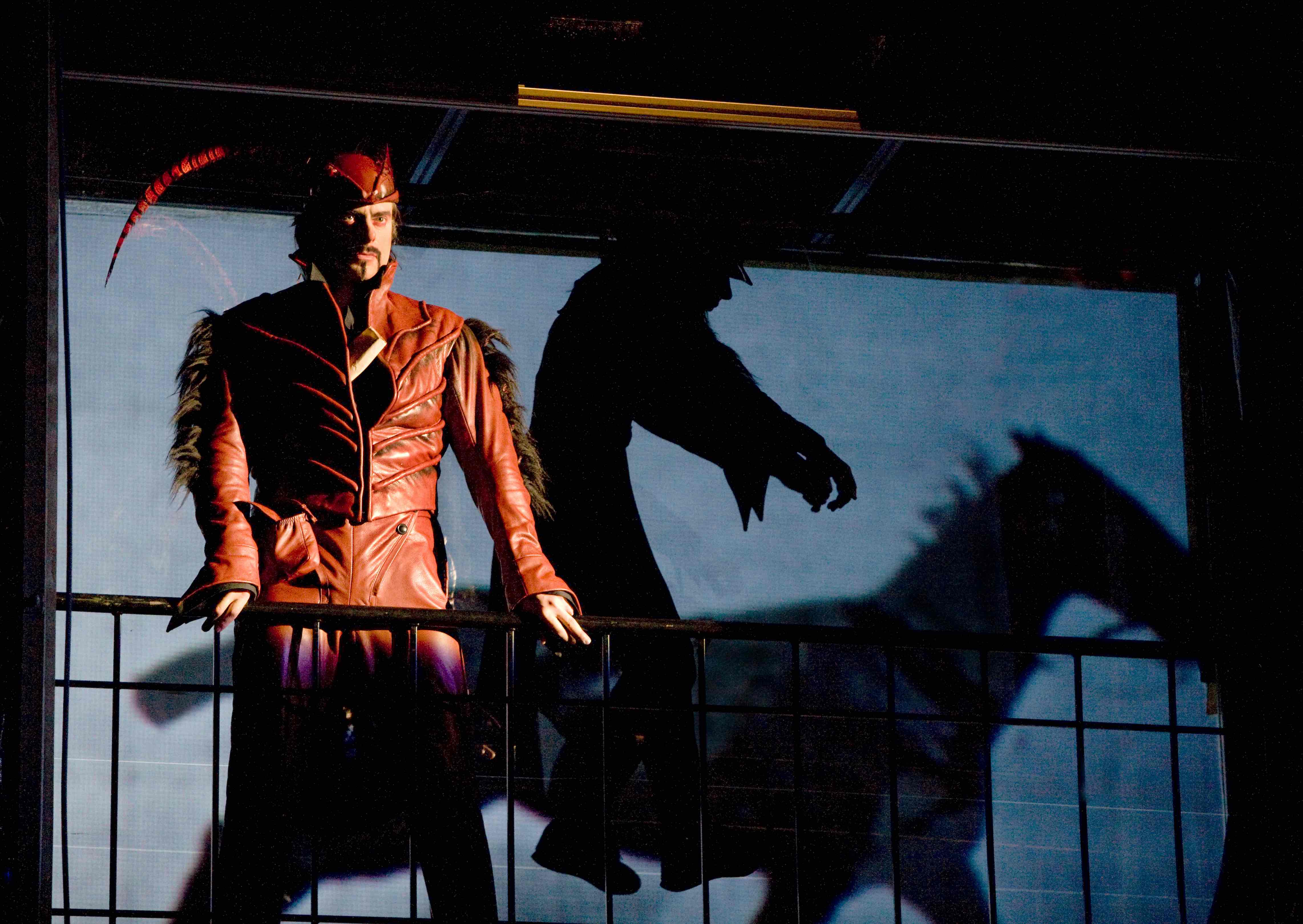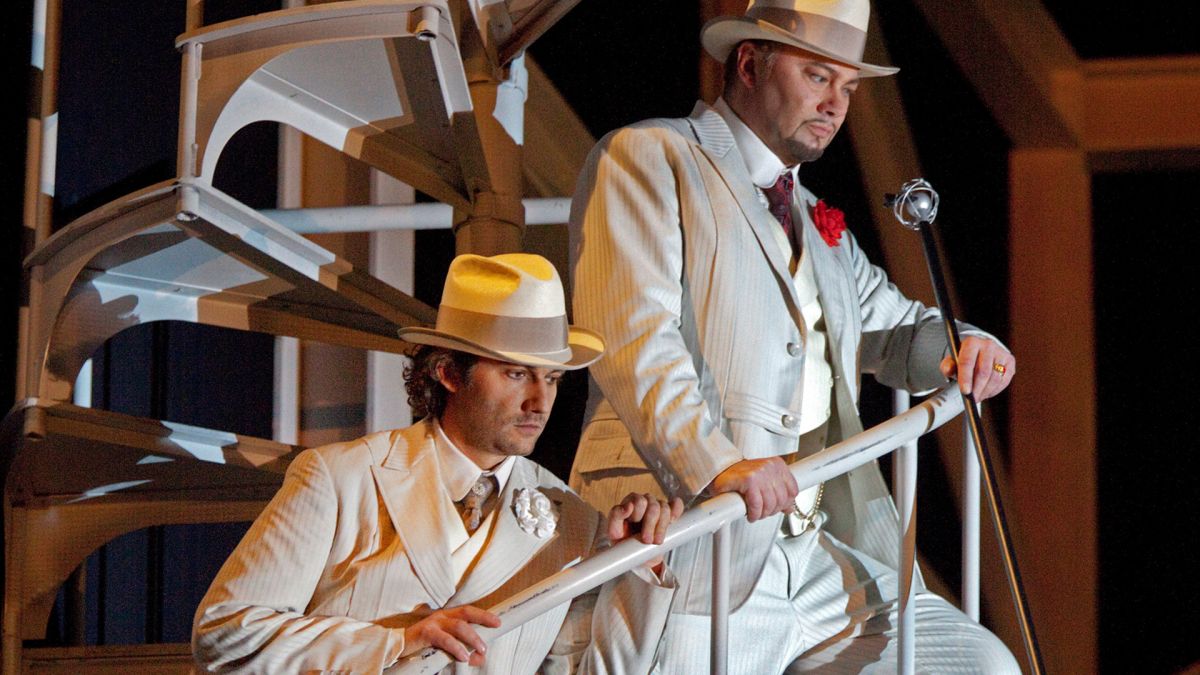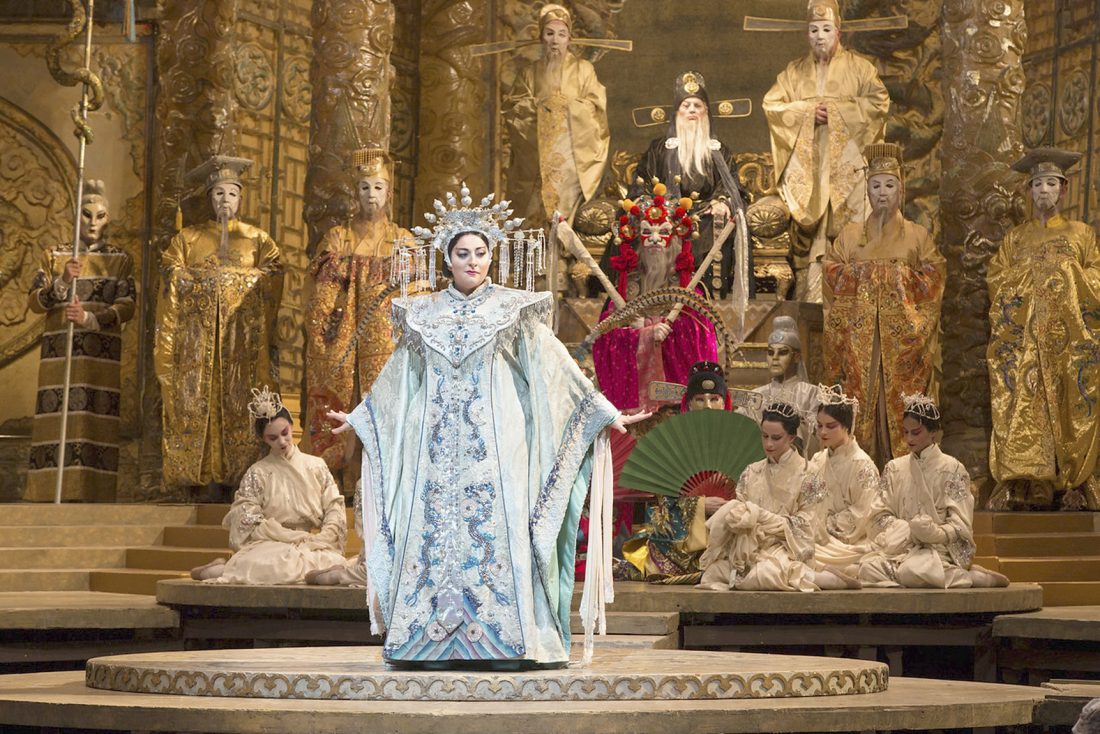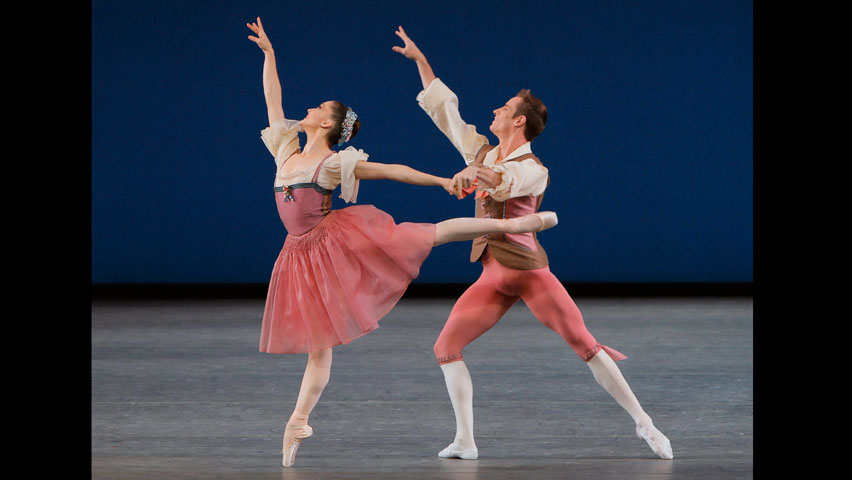VIEWPOINTS – Streaming Diary: Dueling FAUST operas, an exceptional TURANDOT, and the end of City Ballet’s Digital Spring Season
- By drediman
- May 31, 2020
- No Comments
And so the quarantining continues, as does my performing arts streaming. Here are my latest thoughts …
OPERA
Over the past week or so, I streamed three performances of note, each of them through the Metropolitan Opera’s Nightly Opera Stream. This viewing batch included a pair of French operas based on the Faust legend (about the proverbial man who sells his soul to the devil) – a 2008 performance of Hector Berlioz’s 1846 La damnation de Faust and a 2011 performance of Charles Gounod’s 1859 Faust. Conspicuously missing was Mefistofele, Arrigo Boito’s fantastical Italian adaptation. In addition to these dueling Fausts, I also caught a 2019 performance of Giacomo Puccini’s famous, “Nessun dorma”-producing opera Turandot.

John Relyea in the Metropolitan Opera’s production of Berlioz’s “La damnation de Faust”.
Musically, of the two Faust operas, I prefer the Berlioz version, with its sensational orchestral storyboards, including a truly terrifying aural journey into the guts of Hell to conclude the opera. Despite the score’s glories, La damnation de Faust (HIGHLY RECOMMENDED) has always struck me as more oratorio than opera, unfolding as a series of episodic highlights rather than a cohesive narrative. Luckily, the projection-heavy production by high concept stage director Robert Lepage — who would later mount a highly controversial Ring Cycle for the Met — understands the opera’s limitations as theater, and has instead presented the work as a hallucinatory visual tone poem that ingeniously responds to the music’s evocations.
It must be noted that the work also works brilliantly sans the high tech production (simply through the strength of Berlioz’s rich musical composition), as evidenced by the Met’s recent concert version of the opera (the planned revival of the Lepage production was scrapped because of complications surrounding its elaborate projection design). The 2008 cast was excellent, including solid work from star mezzo-soprano Susan Graham as Marguerite, tenor Marcello Giordani as a proficient Faust, and bass-baritone John Relyea as a pointed Mephistopheles. Under the baton of former music director James Levine, the Met Orchestra met the demands of the score dazzlingly.

Jonas Kaufmann and René Pape in the Metropolitan Opera’s production of Gounod’s “Faust”.
Then we have Gounod’s Faust (RECOMMENDED), which premiered just over a decade after Berlioz’s work. In many ways, Gounod’s interpretation is quintessential grand opera, with its luxurious array of arias and choral set pieces. Gone is the daringly concise but cosmic construction of the Berlioz opera. In its stead is a more conventional narrative focusing on the title character’s doomed romantic relationship with Marguerite. As a result, the piece has a completely different texture and actually feels substantially more intimate than La damnation de Faust, despite boasting a runtime that’s twice as long.
The current Met production has been directed by Tony-winning theater director Des McAnuff, who is mainly known for staging Broadway musical blockbusters like Jersey Boys and The Who’s Tommy. Mr. McAnuff boldly resets the opera in a laboratory circa World War II and re-envisions Faust as a nuclear physicist (!). Riddled by guilt over having concocted the atomic bomb, he’s visited by the devil to face his past. Sounds a little far-fetched? Well, in many ways it awkwardly was.
Luckily, in the hands of sought-after superstar tenor Jonas Kaufmann (Faust), lovely soprano Marina Poplavskaya (Marguerite), and renowned bass-baritone René Pape (Mephistopheles), the performance ultimately came across as both dramatically and musically viable. In the pit was maestro Yannick Nézet-Séguin, who led the charge with his trademark dynamism and passion. Also, as in the aforementioned Berlioz rendition, the Met Chorus sounded absolutely ravishing.

Christine Goerke leads the Metropolitan Opera’s production of Puccini’s “Turandot”.
One of my regrets last fall was having missed dramatic soprano Christine Goerke take on the title role in Puccini’s hugely popular opera Turandot (HIGHLY RECOMMENDED), which luckily streamed last week. Set in a fairy tale China of the past, the opera tells the story of a beautiful but ruthless princess (the titular Turandot) who beheads her suitors if they fail to successfully answer her riddles. As is wont in fairy tales, Turandot’s hand is eventually won by a hero, who melts her cold heart in the process. For decades now, Franco Zeffirelli’s traditional but lavish staging for the Met has been one of the crown jewels in the opera company’s repertoire of productions. With its opulent, picturesque vistas and overpopulated tableaus, the production is the very definition of extravagance; even via my computer screen, the scale of it all took my breath away.
Ms. Goerke is one of the most exciting singers performing in opera today, with her huge, lustrous instrument (she’s been the recent soprano of choice for Wagner operas) and uncommonly sensitive portrayals. Happily, she did not disappoint as Turandot, giving depth to and injecting humanity into a character who often times comes across as two-dimensional. As her heroic suitor, Azerbaijani tenor Yusif Eyvazov was in fine voice, nailing perhaps the most popular aria in all of opera, “Nessun dorma”, with his effortless yet hefty voice. Rounding out the cast were Eleonora Buratto and longtime Met legend James Morris; both gave touching performances in secondary roles. Mr. Nézet-Séguin’s work in the pit brought out color and character from Puccini’s beloved score. All in all, an exceptional performance.
DANCE

Ashley Bouder and Andrew Veyette of New York City Ballet in Balanchine’s “Donizetti Variations”.
This past week also saw the sad end of New York City Ballet’s Digital Spring Season. Each week from mid-April through the end of May, the world famous company streamed two programs of past performances from its astonishingly deep portfolio of ballets. Although the programming was, predictably, heavily weighted towards the works of George Balanchine (the hugely influential dance-maker who founded City Ballet), there were also ample samplings of the works of contemporary choreographers, notably major talents like Alexei Ratmansky, Christopher Wheeldon, and Justin Peck. The overall result was an experience that admirably resembled an actual City Ballet season.
Tuesday’s program was a 2015 rendition of Balanchine’s plotless 1960 ballet Donizetti Variations (HIGHLY RECOMMENDED), led by principals Ashley Bouder and Andrew Veyette. It was a performance that captured the essence and joy of classical ballet without, thankfully, being restricted by a storyline. Particularly sparkling was the technically brilliant Ms. Bouder, whose playful, bold performance was a definite standout. Indeed, it was exhilarating to behold her push her technique to daredevil extremes.
Friday’s final program was comprised of a medley of 21st century works created specifically for City Ballet (RECOMMENDED). These included Justin Peck’s Easy, Pam Tanowitz’s Bartók Ballet (excerpt), Alexei Ratmansky’s Voices (excerpt), Gianna Reisen’s Composer’s Holiday (excerpt), Kyle Abraham’s The Runaway (excerpt), Justin Peck’s The Times Are Racing (excerpt), and Mauro Bigonzetti’s Oltremare (excerpt). Although the quality across these ballets varied, watching them back-to-back emphasized just how well-trained and musically-attuned the company’s dancers are, irrespective of choreographic styles.

 Copyright © 2024
Copyright © 2024
Leave a Reply